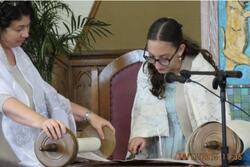And It Will Touch Your Heart
Julie Seltzer took on the unusual role of writing the Torah on public display when the Contemporary Jewish Museum in San Francisco commissioned her for this year-long project. Sometimes sofrim begin with the start of the Torah, Bereishit, but sometimes they start elsewhere; there is no requirement to write the Torah in narrative order. In this exclusive excerpt from her in-progress memoir, Julie reflects on opening her Torah to the second sheet (the first she would be writing) to begin this historic work.
At the museum in that first week, between introductions and protocol and photo shoots, I finally took out my Tikkun, the book used to copy the Torah from, word for word, line for line, eye for eye, and tooth for tooth. I opened up to page two.
Here were the first words of my Torah. My Torah – as if these words were mine.
והוא ימשל בך . And he will rule over you.
The setting is the Garden of Eden, and the context is God’s curse on Eve for eating of the forbidden fruit. The full verse reads: To the woman God said, "I shall surely increase your sorrow in your pregnancy; in pain you will bear children. Towards your man will be your desire, and he will rule over you."
I laughed. What could I do but laugh? If all went according to plan, I’d be the second woman in known history to write a complete Torah. And I was beginning smack in the middle of God’s curse on Eve, a verse seen as a source for women’s subjugation in society: And he will rule over you. I always thought of the verse as descriptive, not prescriptive, and yet: was I reinforcing its power by reproducing the words? Was I subjugating myself by my very own hand? At the same time, I felt a certain excitement at the prospect of interpreting the verse in a new way, just like the Rabbis did. They frequently turn the simple meaning of a verse on its head. It’s the more disconcerting sections we can have the most fun with: What’s the point in reinterpreting something we all agree on? I was never a fan of spoon-fed spirituality. The sludge was where the good stuff was.
On my way home from the museum that day, I sat staring into space on the BART, the unfamiliar transit system in this unfamiliar city on the west coast which felt like a foreign country to me. I plopped myself down on the comfortable seats, exceedingly aware of the cleanliness that comes as a result of the No Eating No Drinking No Graffiti signs. “Comfortable” is a funny thing. I felt more comfortable on the New York City trains, without the rules, where you can spill your coffee and drop your muffin crumbs and listen to your headphones at full decibel and stare at people. On the BART, it’s not permissible to stare at people. You can only stare into space.
And so, as I stared into space, I saw the words, the words that would be my first words of Torah, hovering above. והוא ימשל בך . And he will rule over you. I thought of what the Ramban taught about the primordial Torah, how the letters were strung together in one long Torah-word, without spaces separating individual words, and I watched the letters of my verse meld together, swimming towards one another in the clean comfortable air of the BART. והואימשלבך. Andhewillruleoveryou. When the string of letters came apart again, the spaces between the words had shifted. Differently divided, the letters form new words. והוא ימשש לבך. The letter shin doubled itself in the swim, but all else remained the same.
והוא ימשש לבך. And it will touch your heart.
I gasped. The BART riders looked over. It’s permissible to stare when someone does something strange. My mouth was wide open and in came the clean BART air.
AndHeWillRuleOverYou = AndItWillTouchYourHeart.
This was even more thrilling than I’d hoped for. I peered around the car and closed my mouth incrementally, tricking the riders into believing that it had never been open to begin with. This was truly awesome. Over the next few days, I contemplated this alternative way of understanding the text. I didn’t believe this meaning was “in there” and I’d “discovered” it; rather, that we can create meaning if we look for it. This, to me, was no less valid and no less interesting. After several more days of preparation, the time came to begin the actual writing. With a new perspective on the ancient words in my heart, and the entire staff of the museum encircling me, their hopes for the exhibit pinned to my lapel mic – I wrote those first words of the Torah. And he will rule over you. As I wrote the revealed words and thought of the ones my mind had fashioned when they met the text, I realized that not just this verse, but the entire narrative of Torah was a garment waiting to be transformed into new and varied functions, and that me and my inner Torah were going to get real intimate this year. I commit to seeing what she’s made of beyond her clothing, beyond what she presents to the world. Would she commit to doing the same for me?
The Jewish Women’s Archive is hosting an Online Learning Program with Julie on February 14th at 1:00 PM EST. Learn more, and register!







I find your translation...hmmm...delicious. I would really love to discuss this with you somehow, as I am working on a huge project for God. I want to be sure I write only of truth. I do not know Hebrew. I have for some time now been studying the interlinear bible both in book and ISA Basic. I am always cross referencing bibles, probably to a fault. LOL I love what you have done here. In a version of the new catholic version it says he shall lord it over you. There is quite a contrast here. How it seems it is saying the woman seeks to control her husband (which we see today) and taken the Catholic version lording it over you...totally fits together. However, in the ISA interlinear program תְּשׁוּקָתֵךְ says the impulse of you for the woman. If google translate is used, (yes I know it is not the best) it says your passion. So, the woman shall have passion for her husband and your translation (and it will touch your heart) it totally, all fits together. There is more to this theory of mine. I really would appreciate a conversation with you about this if you could find the time. Thanks so much.